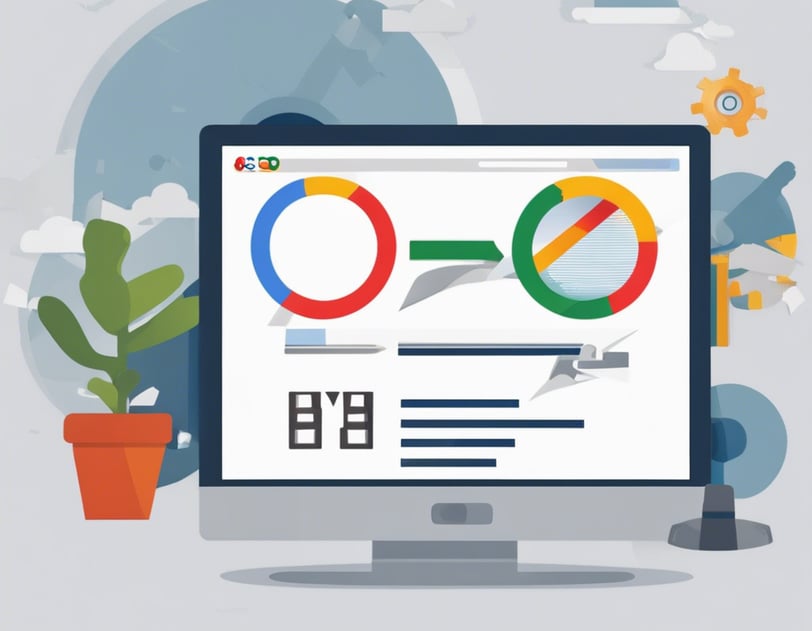5 Common SEO Errors and How to Fix Them - SEO Portugal
Is your Portuguese website invisible in search engines? Discover the 5 most common SEO errors and how to fix them - SEO Portugal
SEO
André Quintal
2/23/20249 min read


You've invested in a beautiful website, filled it with helpful content, and waited for the visitors (and sales) to roll in. But…crickets. If your Portuguese website is struggling to gain visibility on search engines, you're not alone. Search Engine Optimization (SEO) is complex, but don't despair. Let's uncover the common culprits hindering your website's success and how to turn things around. Your website is a vital part of your digital marketing efforts, so let's get it working its hardest for you!
1. Neglecting the Power of Local SEO
The global Portuguese market offers potential, but for smaller businesses or market newcomers, a hyper-focused local SEO strategy creates a more immediate impact. It prioritizes visibility when people in specific regions or cities in Portugal search for products or services like yours.
Why Local SEO Matters for Business Growth
Less Competition, Higher Conversion: Narrowing your focus geographically reduces competition, helping you break through the noise and rank higher in relevant searches. This translates into more targeted traffic of people ready to buy.
Increased Community Engagement: Local SEO boosts your digital footprint within the community you serve. This builds valuable trust and encourages potential customers to see you as a genuine business invested in the local market.
Maximizing Mobile Search: People often turn to their phones to find businesses "near me." Strong local SEO ensures you appear front and center in the search results, especially for mobile users.
Building a Foundation for Expansion: Success in a local area paves the way for scaling your reach and targeting broader Portuguese markets as your business grows.
Actionable Tips
Claim & Optimize Your Google My Business Listing: This is ground zero for local SEO success. Ensure your business's information (address, hours, phone number, etc.) is accurate and complete. Actively encourage reviews, and showcase your products or services with photos.
Localize Your Keywords: If you're offering a translation service, going beyond "Translation Services" is crucial. Research tools like Google's Keyword Planner for local variations (e.g., "Translation Services Porto") and naturally integrate these terms into your site's content. Consider regional slang or colloquialisms used in your target market to further refine targeting.
Embrace Portuguese Directories and Niche Sites: Boost your presence by listing your business in relevant online directories (think Portugal's equivalent to YellowPages) and niche-specific websites that cater to your industry. These listings increase authority and provide valuable backlinks.
Partner for Local Visibility: Consider collaborating with non-competing businesses serving the same region. Cross-promotions on websites or social media marketing campaigns tap into a complementary audience, boosting brand awareness in your area.
The Power of Local Content: Blogging about local events, offering location-specific guides, or even creating guest posts for community blogs demonstrates a genuine investment in the area you serve. This signals that you're not just focused on sales, but on becoming a valuable resource for the local community.
2. Underestimating Technical SEO


Imagine pouring time and effort into a website filled with exceptional content. Sadly, if its technical foundation is shaky, search engines may struggle to even find it. Technical SEO focuses on the behind-the-scenes elements that ensure your website plays nicely with search engines' bots, allowing them to properly crawl, index, and understand your content.
Why Technical SEO is a Must for Visibility
Website as a Map: Think of your sitemap and robots.txt as digital guides for search engines. A sitemap clearly outlines your website's structure, while the robots.txt file indicates which areas should or shouldn't be crawled. Without these, search engines might miss crucial pages.
No Dead-Ends Allowed: Broken links are like potholes on a road – disruptive to the user experience. They also signal to search engines that your site isn't well-maintained. Regular checks and fixes using tools like Screaming Frog ensure visitors AND search engine bots can always find what they're looking for.
Mobile Matters More Than Ever: Over half of the internet traffic comes from mobile devices. If your website is slow, clunky to navigate, or displays poorly on smartphones and tablets, Google will penalize you in its search engine rankings. Responsive design and fast load times are non-negotiable for search engine optimization.
Speed of Success: Page speed isn't just about user experience; it's a direct ranking factor. Fast websites signal to search engines that you value efficiency and provide a positive experience, giving you a competitive edge.
Actionable Tips
Sitemap & Robots.txt Check: If they're missing or incorrect, use online generators and submit them to Google Search Console for faster indexing.
Broken Link Hunting: Regularly use a tool like Screaming Frog to identify broken links (both internal and external), and fix them promptly.
Mobile Usability Test: Use Google's Mobile-Friendly Test tool to analyze your website's performance on mobile and identify any issues hurting your rankings.
Optimizing for Core Web Vitals: Utilize Google's Lighthouse tool (found within Chrome browser or as its own extension) to measure Core Web Vitals (speed metrics). Use the report to pinpoint areas for further optimization to boost your page speed scores.
3. Forgetting the User Experience


It's tempting to focus strictly on optimizing for search engines' algorithms, but never forget that ultimately websites serve people. A visually chaotic, slow-loading, or confusing website will send visitors running, no matter how many keywords you've crammed in. Today, search engines like Google recognize this and reward sites prioritizing a stellar user experience (UX).
Why User Experience is Key to SEO Success
Dwell Time and Bounce Rate Matter: Google tracks how long people stay on your website after landing there from a search result. If users quickly hit the "back" button (high bounce rate), it signals your page wasn't relevant or engaging. This harms your rankings.
Engagement is King: Are people clicking on your links, scrolling, or taking action? Engaged visitors signal to search engines that your content is worthwhile, boosting its visibility over time.
It's Not Just About Speed: Yes, a slow website is poison for UX, but it's not the sole factor in search engine optimization. Intuitive navigation, a visually appealing layout, and content that is easy to digest contribute to a satisfying experience.
Accessibility Expands Your Audience: Consider the importance of web design that accommodates users with visual impairments, motor difficulties, or cognitive disabilities. Not only is this inclusive, but it can also boost your SEO!
Actionable Tips
Speed as a Baseline: Utilize Google PageSpeed Insights to pinpoint problem areas slowing you down. Compress images, minify code, or consider a Content Delivery Network (CDN) to improve load times.
Navigation as Your Compass: Ensure your menus are logical and clearly labeled. Breadcrumb navigation helps users understand their location within your site. Don't underestimate the power of an effective search bar within your site.
Content Formatting for Readability: Don't just dump text onto a page! Use headings, subheadings, bullet points, and short paragraphs to make your content easily scannable. Images and videos break up text and enhance engagement.
Mobile-First Mindset: Since most of your traffic likely comes from mobile, design for smaller screens. Ensure buttons are big enough to tap, text is readable, and your layout adapts to any device seamlessly. This emphasis on the mobile experience is crucial for positive search engine optimization results.
4. Ignoring the Power of Keywords


Keywords are the backbone of how people discover websites. They act as a signal to search engines about the relevance of your content to specific queries. A well-crafted keyword strategy ensures those searching for products or services like yours will have the best chance of finding your website. However, this requires a nuanced approach that goes beyond simply scattering words across your pages.
Why Keyword Research is Essential
Understand Your Target Audience: Research tools like Google Keyword Planner or Ubersuggest aren't just about discovering terms; they help you understand how your Portuguese customers search. This informs your entire content strategy, ensuring you speak their language.
The Power of Specificity: While broad keywords like "web design" are tempting, they're highly competitive. Long-tail keywords like "Vila Nova de Gaia web design" focus your efforts, attracting targeted traffic that's more likely to convert into paying customers.
Balancing Volume and Relevancy: It's tempting to chase keywords with huge search volumes, but if they're not truly aligned with your offerings, they'll hurt you long-term. Focus on keywords relevant to your niche and location, even with lower search volumes.
Actionable Tips
Beyond Just Titles and Headings: Yes, keywords matter in those places, but so does natural use throughout your content. Focus on creating valuable information that solves problems your audience has, organically weaving relevant keywords within it for maximum search engine optimization impact.
Think Like Your Customer: What questions are they asking? Consider using a tool like "Answer The Public" to discover search queries related to your core topics. Answering those in your content boosts visibility.
Synonyms and Context: Don't get stuck on one exact variation of a keyword. Search engines understand that words like "repair" and "fix" are often used interchangeably. Naturally mixing related terms enhances your relevance.
Local Matters: Incorporate location-specific keywords whenever applicable. This strengthens your signal for local searches within Portugal (eg. "Translation services in Porto" ).
5. Overlooking the Value of Content


In a crowded digital landscape, high-quality, original content isn't simply an SEO tactic; it's how you demonstrate expertise and cultivate trust with your potential customers. Forget thin, generic content designed to appease search engines — focus on providing actionable value to your Portuguese audience.
Why Content is Key for Building Authority
Solve, Don't Sell: While the end goal is sales, content shouldn't just be a long advertisement. Blog posts, guides, or even videos that dive deep into pain points your audience faces build credibility far faster than generic product descriptions.
Establish Yourself as the Expert: In-depth content demonstrates that you're not just a company, but a source of reliable knowledge in your industry. This positions you as the go-to choice for solutions.
Evergreen Value: A well-written, informative article addressing a core problem your audience faces remains valuable months, even years from now. This translates to ongoing SEO benefits and continued traffic.
Freshness Signals Relevance: Don't just post content and forget it. Regular updates to existing pages show Google your site is active and maintained. It's a simple, but powerful, signal that you're invested in providing the most up-to-date information.
Actionable Tips
Target Audience First: Before you write a word, know exactly who you speak to. Their challenges, needs, and even language preference will inform the type of content you create and the keywords you target.
Go Beyond Blog Posts: Repurpose content! Transform a popular blog into a downloadable guide, or create a social media infographic highlighting key stats. This expands reach and reinforces your main messages.
Visuals as Support: Don't forget the power of images and videos to explain complex ideas, illustrate data, or bring personality to your content. Always optimize them (file size, alt-text descriptions) for SEO benefits.
Extra Tips to Boost Your Search Engine Optimization


While fixing the core errors discussed is crucial, think of SEO as a marathon, not a sprint. Here are some additional strategies to integrate into your long-term approach for greater Portuguese market visibility:
Backlinks: The Vote of Confidence: When reputable Portuguese websites (blogs, industry portals, etc.) link back to yours, it signals to Google that your content is trustworthy. Guest blogging on relevant sites or participating in niche online communities can naturally build these valuable links.
Social Signals Matter: While shares and likes aren't a direct ranking factor, an active social media presence fuels brand awareness and drives traffic to your website. This indirect engagement positively influences how search engines view your overall online presence.
The Marathon Mindset: SEO is a process of continuous improvement. Algorithm updates, competitor activity, and your own content output require consistent effort. Monitor your rankings, analyze website traffic data, and adapt your strategies to maximize your Portuguese search engine visibility over time.
SEO is an investment in your Portuguese website's long-term success. Avoid these common pitfalls and take intentional steps to boost your online visibility. Attract more traffic, leads, and customers – and watch your business thrive in the Portuguese market.
Need a Professional Touch?
While these tips offer a powerful start to improving your visibility, achieving truly exceptional results often demands a deeper level of expertise and ongoing commitment. Consider partnering with a specialized SEO agency in Portugal. Our team combines extensive local market knowledge with the most cutting-edge SEO tools to thoroughly analyze your website and craft a tailored strategy designed to propel your business forward.
Here's why a partnership makes sense:
Save Precious Time: Focus on what you do best – running your business. Let us handle the complexities of optimizing your website, freeing up your valuable time.
Stay Ahead of the Curve: Search Engine Optimization is a dynamic field. Our team stays on top of algorithm changes and industry trends, ensuring your strategy doesn't fall behind in the competitive Portuguese market.
Measurable Results: We don't guess; we track progress with detailed reports. This transparency allows you to see how your investment translates into tangible growth like increased website traffic, leads, and online sales.
Ready to unlock the full potential of your Portuguese website? Contact us today for a personalized consultation and discover the difference expert SEO can make.


